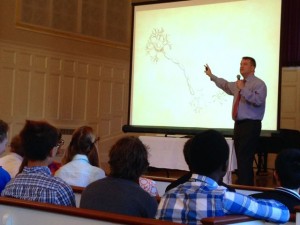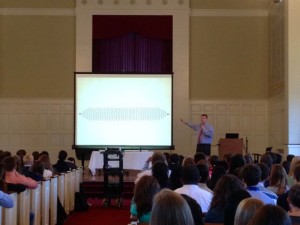 There was just one phrase that Andrew Watson wanted students to remember after Upper School assembly on Friday morning. He had the students write it down:
There was just one phrase that Andrew Watson wanted students to remember after Upper School assembly on Friday morning. He had the students write it down:
“I am not a turtle,” they wrote.
Mr. Watson, of Translate the Brain, had returned to the Williston Northampton School for his second year to talk about neurological studies and how those translated into studying more effectively.
While a baby turtle is born with all the neural pathways it will ever used, or ever need, human brains are constantly evolving, Mr. Watson explained.
“During the time we’ve been alive, the way we’ve studied the brain has very dramatically changed,” he said, adding that scientists now understood that memory was not static, but growing and changing.
 And with that in mind, he said, the idea that a single test determined any future potential was a bit like measuring someone in third grade and then buying them clothes for the rest of their life.
And with that in mind, he said, the idea that a single test determined any future potential was a bit like measuring someone in third grade and then buying them clothes for the rest of their life.
Mr. Watson had previously spoken at Williston last November when he gave a talk on “How to Study Less and Learn More.” His new presentation built upon the previous one, with Mr. Watson occasionally referring to material he had talked about the year before.
The best ways for students to study were still to focus on the task (studies have shown that even quiet music is distracting), exercise, and review the material through “blank page” strategies, which required active learning techniques like filling in blanks on practice quizzes, and using flashcards.
He said students should always be telling themselves, “If I do the right amount of the right practice, I can learn this.”
“Learning literally means building neural networks,” he said. “There is no limit to learning.”

